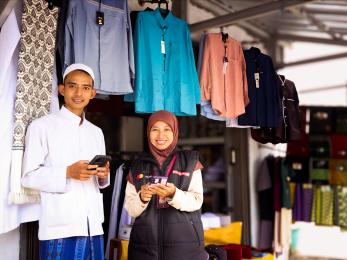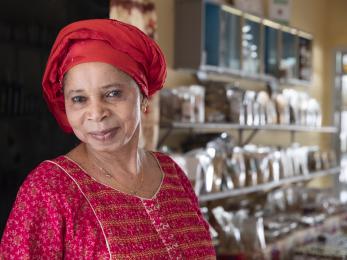How we’re empowering young entrepreneurs in the wake of revolution
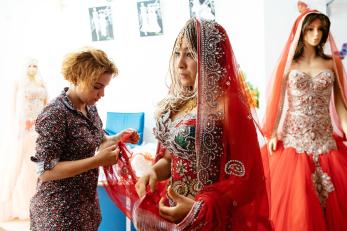
Each dress that Olfa carefully sews by hand takes about 3,500 Tunisian dinars — about $1,700 American dollars — of delicate satin, crepe, tulle, sequins and rhinestones to create. To make a single dress for a client, Olfa works day and night for a full week. But in the end, it’s all worth it.
“It’s indescribable. I get very happy,” she said of the feeling she gets when she sells a dress for a wedding. “Most of all, I want the bride to wear my dress.”
Olfa, 27, runs her own high-end dress shop in the town of Medenine in southern Tunisia. She’s quickly become a successful entrepreneur, thanks to her talent, training, determination, and a little help from Mercy Corps in the form of a loan.
Just a few years ago, Olfa’s success story would have been unlikely, if not impossible.
Before Tunisia’s recent revolution, starting a small business as a young person was a challenge in patience and bureaucracy. Unless you were connected to the right people, you had to submit your business idea to a government agency and wait for approval — often a very slow process that was full of restrictions.
Arab Spring brings democracy — and a struggling economy
In late 2010, after nearly three decades of dictatorship under President Ben Ali, protests turned to revolution in Tunisia and the Arab Spring was born.
Several months of demonstrations against the corrupt Ben Ali government eventually led to its downfall, but hundreds of people were killed in clashes with officials as the protests gained momentum.
After the government was reshuffled several times, Tunisia finally held democratic elections in March 2011. The protests sparked uprisings in countries from Iraq to Libya — collectively referred to as the Arab Spring — that are still transforming the region today.
While Tunisia is seen as a success story, in reality, the situation is complex. The country’s new freedom has opened many doors for people like Olfa — there’s less corruption, more freedom of speech, and an opportunity for organizations like Mercy Corps to help people find their own economic success.
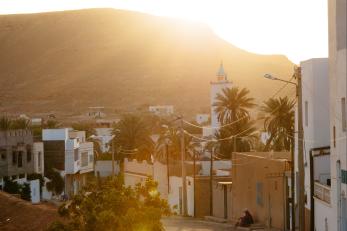
But Tunisia’s revolution also had consequences. Creating a fair democracy with proper social services after an era of dictatorship isn’t easy, and a rise in violent extremism led to a significant fall in tourism — one of the country’s most profitable sectors. The longstanding issue of economic disparity has yet to be resolved.
Now, five years after the protests began, the economy is struggling. Making a decent living outside the capital of Tunis is difficult and unemployment is staggeringly high. The country still lacks access to good jobs and the social services needed for young people to start their own businesses.
Mercy Corps is working in Tunisia to support local community organizations, promote peaceful conflict resolution, and empower women and youth to play a leading role in resolving Tunisia’s economic challenges.
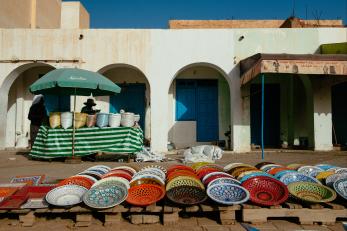
In a complex crisis, where political unrest and dysfunction collide with humanitarian needs like access to financial services and economic support, it’s critical that we address these issues with an eye on the long term.
Our work there with young entrepreneurs is designed to create change in one community at a time and build more economic stability. Tunisia is on the road to recovery after revolution, but we must help people, particularly youth, learn how to succeed in this new environment.
New freedom, new opportunity
Young people make up half of Tunisia’s population and played a leading role in the protests that led to Ben Ali’s demise. But even in the new democracy, there is little in the way of economic opportunity for youth, particularly those who live anywhere outside the capital.
The prospects are dire even for young people who’ve attended university — the unemployment rate for a person with a degree is 33 percent on average. Nearly half of women — 47 percent — can’t find work. Those who want to be successful often move to the capital of Tunis, leaving more rural towns and inland cities out of any positive economic development.
To help youth in Tunisia make their dreams a reality, we are working to give them the resources and support they need to start their own businesses and make a positive impact on their local economies.
Below, learn more about Olfa’s story and meet some other young entrepreneurs we’re supporting in Tunisia, and see how they’re turning their ambitions into new business ventures.
Olfa: Bringing high fashion to Medenine
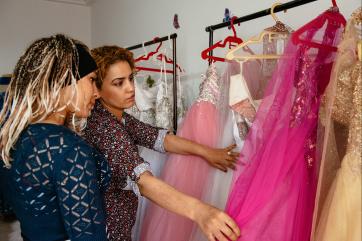
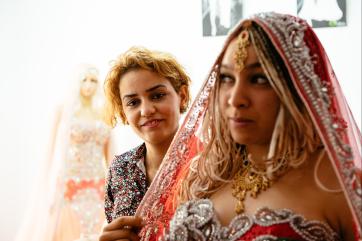
Olfa moved from her hometown of Medenine to bustling Tunis to attend a university, where she studied fashion design. When she recently married and moved back to Medenine, Olfa realized that to continue her trade in a smaller town, she’d have to start her own business.
Dressmaking isn’t uncommon in southern Tunisia, but creating a more formal fashion line as a young entrepreneur is something that hasn’t been done here before. Local banks were hesitant, fearing that there wasn’t a local market for Olfa’s fashions. “They turned me down twice because they thought the project wouldn’t work here in the south.”
Eventually, with determination, Olfa convinced a bank to give her her first loan, which she used to buy sewing machines and other equipment. To get her shop up and running, she would still need fabric and other materials. She was at a standstill until she heard about Mercy Corps business training.
Olfa joined the Mercy Corps training and worked hard to create a business plan and earn one of the available loans to purchase the needed materials. Each of Olfa’s elaborate designs, worn for weddings and other formal events, is hand-sewn with intense attention to every detail and every sequin.
After she created her first full collection of 25 dresses, Olfa decided to hold a fashion show in Medenine to get the word out about her new business. She recruited models off the street and posted flyers around town before the event. By the day of the show, hundreds of people came out for the event.
“In the beginning, I didn’t have customers,” said Olfa. “But after the fashion show, I’m doing well. Almost all of Medenine knows me.” Now, Olfa takes custom orders for new dresses and also rents dresses to customers for a lower cost. She’s hired one employee since she started, and is busy working on her second collection.
Norhene: Creating custom furniture in her hometown
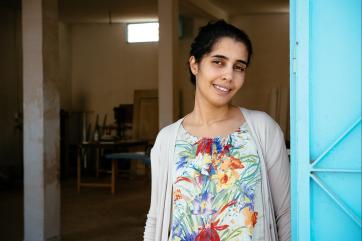
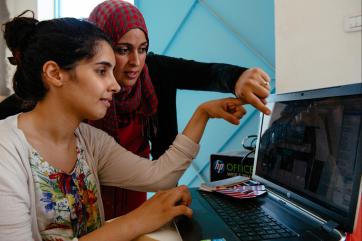
Norhene attended art school in Tunis, studying interior design, and worked in a furniture studio there for three years. She wanted nothing more than to bring her artistic talents back to her hometown of Medenine, but she faced challenges at every turn.
There is no furniture or design sector in her hometown, and accessing the basic services needed to start her own business — financial loans, business training, building space to rent — was difficult and time-consuming. It took Norhene two years of persistence to get her furniture shop up and running in Medenine.
“It was a big challenge for me,” said Norhene. “It’s a big challenge for anyone because we need experience. Tunisia is going through a difficult time — the economy is not doing that well.”
Norhene got a loan from a local bank to set up her furniture studio, but she needed additional resources for start-up materials. A Mercy Corps microfinance institution gave Norhene a $5,000 loan for the supplies that she needed, and now she’s on her way to running a successful business.
The furniture studio in Medenine has been open for several months, and Norhene is busy designing and building custom furniture for her clients. Soon, she hopes to add an upholstery space and a showroom to expand her offerings.
Farouk: Stylish seating from recycled materials

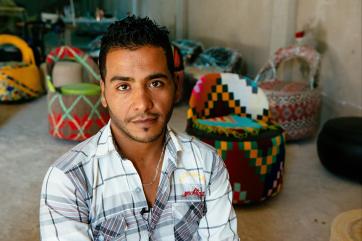
After the revolution, Farouk was one of many young people who struggled to find work. He was underemployed for over a year, taking work here and there where he could in his town, Kasserine. The effects of the lagging economy hit him hard.
“There are no more jobs in the public sector,” said Farouk. “The only thing left was to start your own business or work for someone else.”
While he tried to figure out his next steps, Farouk spent many hours in a local coffee shop that was located across from a tire shop. His time there sparked a new business idea. “A man across the street was using the tires to sit on,” Farouk remembered. “He put two tires one on top of another and used them as a pouf.”
Farouk began to think about how tires could be recycled and used as a new material for furniture. “I wanted to do something of my own. I wanted to create something personal that was a new idea and was mine.” Before long, designs for comfortable recycled tire furniture were running through his head.
Farouk participated in a Mercy Corps business training and received a loan to help him start his business of turning old tires into stylish, affordable chairs and poufs.
He’s still worried about the local economy, but Farouk has already seen some success with his products. He’s sold to local clients and even has some of his furniture pieces in a local hotel. “I will continue. I believe in the future,” said Farouk.
Despite the challenges he’s faced, and those that he continues to see in his community, Farouk maintains hope for a better Tunisia. “I hope that we overcome this period and that Tunisia will give a more important role to young people.”
Investing in youth for long-term success
The revolution in Tunisia led to significant political change, but its success in the long term hinges on creating a more prosperous economy. Youth — who make up half of the country’s entire population — are the key to capitalizing on the new opportunity that Tunisia’s democracy provides.
Our programs partner with local communities to empower young people to create their own businesses and achieve their goals. When people like Norhene, Farouk and Olfa launch new, innovative businesses in their hometowns, they create more economic opportunities around them as they hire employees and inspire others.
As we face complex crises — where political unrest and dysfunction collide with humanitarian needs — around the world, Mercy Corps’ work in Tunisia is an example of how investing in the ambition and talent of youth can jump-start economies and eventually lead to a stronger future.

